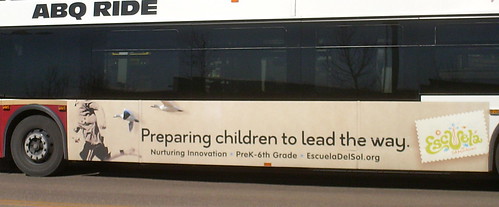BUS STORY # 240 (The Charter School Teacher)
My seat mate starts a conversation by asking me where I work. I tell him and return the question. He’s a teacher. He teaches junior high at a charter school.
How long has he been doing this?
Teaching? All his adult life. Junior high, six years.
Junior high, I muse out loud, and shake my head. Toughest gig in teaching. I ask him how he keeps from burning out.
He says he burnt out teaching public high school. The charter school has actually been a relief.
He looks to be in his 50s, square, strong face, gray hair combed straight back, rimless glasses. He’s articulate.
I ask him why teaching junior high in a charter school is easier than teaching public high school.
He explains his current class size is 20 students. It’s at least 35, usually more, in the public schools. He says with the smaller size class, you can make a difference.
He also explains that the rules are tougher: some principles have a one-strike-and-you’re-out policy.
He also explains that parental involvement is extremely high at his school, a marked difference between this and his Albuquerque Public Schools experiences. “It makes a difference.”
I tell him I understand charter schools are for the, quote, non-traditional, unquote, students. I’ve taken that to mean largely teenaged parents.
He says it’s a lot more heterogenous than that. His experience is that the majority of the kids were behavioral problems, and that “75 percent” of them respond well to more individualized attention and greater discipline. He says charter school teachers do a lot of teaching outside class hours. He calls it “tutoring,” but I sense there is some counseling and example-setting rolled into the tutoring.
He goes on to explain how the most difficult and frustrating part of the job has nothing to do with teaching. It has to do with negotiating the bureaucracy. Or, rather, bureaucracies. It seems charter schools are required to strictly adhere to the policies of the State of New Mexico, and to the policies of Albuquerque Public Schools. The problem is that the two entities’ policies don’t always match, and sometimes contradict one another. If they follow state policy, they get dinged by APS. And vice versa.
The real problem is that too many dings threaten the school’s existence. He says they’ve already closed three charter schools.
So why do charter schools have to abide by APS policy?
Because they’re really part of the APS and are funded through APS -- at least, initially. He explains that after six years, the charter schools have to come up with their own funding -- grants, federal funds -- whatever is available. Later, I will realize I'm unclear as to whether or not APS has any financial obligation to the charter schools after six years.
What about tuition?
Absolutely not. They remain a public education enterprise. That’s why they get funding from APS. He does offer the opinion that APS is not fond of the charter schools because they cut into the APS share of funding. When I counter with the proposition that it’s still funding for public school students within the district, he suggests the issue is less money for APS administration.
He doesn’t say it, but what I hear is a situation in which APS might have a vested financial interest in seeing charter schools dinged out of existence. I’m wondering if there could be a method in the dueling policies madness.
He says he believes the new governor is serious about cutting the fat from APS, and that he anticipates a significant reduction in the administrative overhead. He’s for that: “The money would be better spent on the kids.” I'm not sure the money is going to be there for anybody, but I keep that thought to myself.
If he's right about the governor, I’m wondering if unemployed policy writers will soon be swelling the ranks of the unemployed.
He has his own concerns about being unemployed. If his school gets closed down, he says he’ll finish his career as a sub. He won’t go back into the public school system. He hopes it doesn’t come to that. He likes what he’s doing and where he is now -- even though it means a daily commute from the West Side.
“Makes for a long day,” he says.
__________
After this encounter, I went on line looking for information about New Mexico charter schools. Here’s a link to FAQs for anyone who’s interested:
http://nmccs.org/index.php?option=com_content&task=view&id=3&Itemid=23


0 Comments:
Post a Comment
<< Home